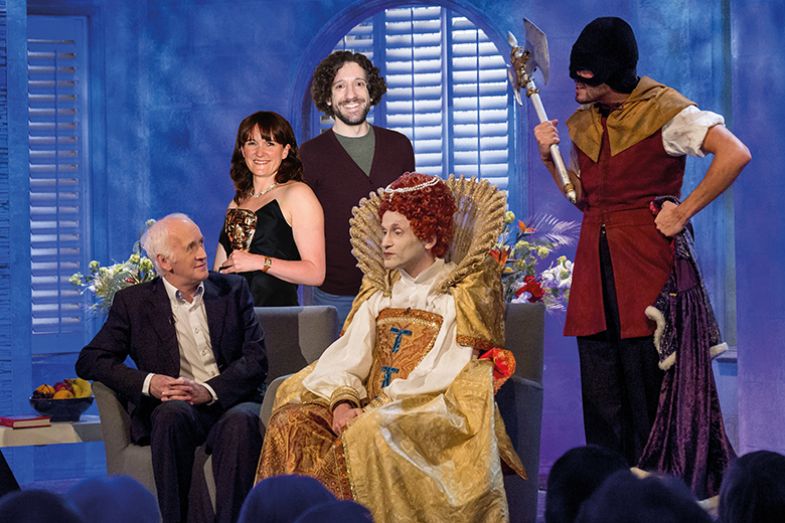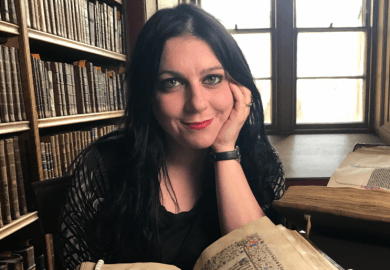Just over a decade ago, the Sunday Express reported that the children’s BBC television show Horrible Histories was calling time because it had “run out of history”. Finding “historical facts that will work” for comedy sketches had become more difficult after five series, explained the show’s co-creator Caroline Norris, quoted back in 2013, who worried that Terry Deary’s best-selling books, on which the franchise was based, had “already taken the best facts”.
That account, however, does not fit the recollection of Ben Ward, head writer of a franchise that is currently screening its 10th series, with an 11th already filmed. “There was a pause after series five, when quite a lot of the cast left, but I never thought the show was ending,” he tells Times Higher Education. Rather, the hiatus allowed Horrible Histories – the first children’s show to win a British Comedy Award – to “pivot to a new format, with guest stars like Ben Miller and Kevin Eldon, and introduce new cast members – people like Lawry Lewin and Tom Stourton, who has become a bit of a star for us. I’ve always wanted it to have a Saturday Night Live feel where we have a great cast but people come and go, and the programme is bigger than any one performer.”
That newspaper story nonetheless raised an interesting point: how do you find fresh material for a comedy show after thousands of sketches that have raided almost every historical era and geography – from the Stone Age to the 1960s space race? The answer lies, to a large extent, with the decision to offer six-week placements to PhD students, usually historians, with an appetite to unearth little-known historical nuggets that the show’s writers can riff on.
“We’ll ask someone to write about 25 pages of interesting things about a topic – though we’ll probably only use about six or seven pages – and they’ll help the writers understand the setting,” says Ward. Access to this depth of expertise on the historical period in question is crucial because writers must ensure that their inventive spin on a character or event doesn’t move from zaniness into falsehood. “Unlike most sketch comedy, the essence of the sketch has to be true – the viewer shouldn’t come away from the sketch with a misleading idea,” he says.
With university-based researchers on board, however, writers can test how far they can take an idea until it becomes detached from historical fact. “When we find something funny about history, we might want to push that idea, so we’ll be asking, ‘Is it fair to say that this would be accurate?’,” says Ward. For instance, a memorable sketch about Vikings’ love for dancing – somewhat belying the Scandinavian marauders’ fearsome reputation – played with the idea without its descending into Pythonesque absurdity.
Scholars will usually have a good idea of what might work for a comedy skit, says Ward, but there is a sometimes a “slight disconnect in terms of what a historian might think is interesting…and what the writers might consider a ‘wow moment’ for the young audience”.
Indeed, sometimes the best comedic ideas arise out of something the researchers hadn’t even considered. “Once a series we get what we call a ‘Columbo moment’,” says Ward. “It usually manifests at the end of a meeting, just as we’re about to leave, and the historian will drop, in passing, some fact they didn’t think was important that will stop everyone in their tracks and get them unpacking their laptops. For example, we might be talking about [Egyptian pharaoh] Ramsses II and the diplomatic tensions with the [Anatolian] Hittites and, as we’re packing up, a historian might say, ‘Of course, it’s amazing that Ramsses got anything done considering he had 160-plus kids.’ ‘Wait, how many?!’”
Enlisting university-based experts in later series has also broadened the historical sweep of the show, says Ward, whose team previously relied on a single historical consultant, the public historian Greg Jenner (now the presenter of BBC hit comedy podcast You’re Dead to Me), or Deary’s books. “As we stopped using the books and doing our own research, the show’s historical scope naturally widened,” says Ward, who believes viewers appreciate this broader sweep through time. “In the early days, we concentrated a lot on the Vikings, Tudors and Romans, partly because we didn’t think children would be so interested in the Celts, Stuarts or Georgians, but that definitely hasn’t been the case,” he says.

Some of the show’s best sketches in recent times have come from mining less well-known historical characters for comic material, says Henry Ajayi Ward, the show’s history producer, who oversees the recruitment of the doctoral researchers and their interaction with the writing team.
“One of our researchers, Anjali Vyas Brannick from the University of York, actually used some original research from her thesis for the core of a sketch in our ‘Precious Planet’ episode,” he says. “That was about the 16th-century poet Thomas Tusser, who passed on his knowledge of plant husbandry through rhyming couplets: it was a brilliant opportunity for Richard David-Caine to dance about. For me, it was one of the best sketches in that episode.”
Ajayi Ward, himself a York history graduate, says the show has been keen to recruit historians from a wide range of fields, even if they will seldom get to dwell on their own specialism. “We’ve had someone studying Renaissance music and the iconography of medieval pilgrims, but they might have been asked to research anything from Winston Churchill’s toilet to ancient Egypt, often in the same day,” he explains.
Employing trained historians as researchers also helps the show to avoid historical clangers, believes Ajayi Ward, who has been working on Horrible Histories since its sixth series. “Someone who isn’t a historian might spot a tale about a Scandinavian king who got his head cut off when a treasure chest slammed shut and think that’s maybe plausible and could work. Historians are on the lookout for that kind of nonsense and will know that it’s probably been made up to serve some political agenda. They’ll look into things and find similar tales of where another king in another country supposedly died [in similar circumstances] a century earlier,” he explains.
Even throwaway lines in a sketch can prove tricky for experts to assess, says Alex Hiscock, who worked on series nine in 2021, before starting a PhD in Roman history at the University of Edinburgh. “One scene was about how [famously rich Roman general and statesman] Crassus made lots of money by buying houses which were on fire and then using his own fire brigade to put out the fire. I had an extended debate with another researcher about how much a house would cost in ancient Rome – we had to check a number of sources to get the answer,” he recalls. “In some cases, we were producing our own research – for instance, depending on what translation of Plutarch and Pliny is used, you get some very different interpretations, and we were encouraged to bring that to the table...It’s pretty deep for a line of comedy.”
Most investigations are entirely outside a researcher’s specialism, explains Cat Watts, a University of Cambridge PhD student focused on early medieval French literature who researched, among others, episodes on the 75th anniversary of the NHS and the history of football. “The football one was incredibly hard to research, but not for the reasons you’d imagine,” says Watts, explaining that although football history is “incredibly well documented”, Horrible Histories does not cover anything that occurred in the last 50 years and “you can’t mention – rightly – anyone who is alive. I’d have loved to do a top 10 fouls, but how can you do that without mentioning Maradona and the Hand of God [in the 1986 World Cup]? I wanted to do something on mascots, but that ran into copyright issues,” she adds.
That said, her studies “outside my comfort zone” of football arguably led to funnier material than the “morning I spent looking into Charlemagne”, reflects Watts. One scene that she researched on Blackheath FC’s president, Francis Maule Campbell, and his failed attempt to ensure that violent hacking of opponents was permitted in the 1865 Cambridge Rules adopted by the Football Association, was instantly seized upon by the show’s writers. “Everyone wanted to write about the founding of the FA and the guy who wanted to kick people in the shins,” Watts recalls.
In recent times, Horrible Histories has shifted its focus away from kings, queens and emperors to profile a broader array of individuals – including famous scientists, musicians, writers and politicians, but also less well-known characters and stories not featured in school history lessons. “The writers seemed more interested in the agricultural and socioeconomic changes occurring in 3rd-century Roman Britain than anything related to emperors – they loved the folk stuff much more than another amusing tale about an emperor,” says Hiscock.
For Watts, that change in emphasis towards more quotidian tales is particularly welcome when it affords an opportunity to correct important historical oversights. Her “Foul Football” episode dwelt, for instance, on how Britain’s women’s leagues were banned for almost 50 years from 1921 because their popularity was deemed a threat to the men’s game. “I’m so thrilled that they invited Jill Scott – the England women’s captain – to present that episode. That was such an amazing statement,” says Watts on the episode’s message that the game belongs to everyone.
But the show’s portrayal of more diverse stories has sometimes caused controversy, with accusations of “wokeism” quick to be levelled. Predictably, that is especially true when black characters are given central billing, such as in the season nine episode on the contribution of black Britons throughout history first screened in April 2021, which ended with the song Been Here From the Start.
Ajayi Ward is adamant that there is “no big voice [from the BBC or executives] telling us that we have to do certain themes. There is no agenda when it comes to the stories we tell – we are only interested in telling stories that matter and are funny. That episode was saying ‘look at our world and all of its complex, intertwining histories’.” Many historical facts that are “interesting and important but not funny” are cast aside, he notes.
Having historical experts on board who can authoritatively rebut criticisms is vital as the show enters contested territory, believes Ajayi Ward, who has “written many letters to people who’ve made such complaints showing them all of our research”.
For his part, Hiscock is proud to have researched the black history episode. “That song, in particular, ruffled feathers, but it is incredibly important to give a voice to groups that have been erased from history,” he says. “Hidden figures like Bishop Hadrian – who came from north Africa in the 7th century – should be known, and I was really keen to have Cheddar Man included too,” he adds, referring to an 11,000-year-old skeleton discovered in a Somerset cave that is believed to have belonged to a man with dark skin tone, suggesting that the first modern Britons were dark skinned.
Meticulous research and rigorous fact-checking have also given the show greater confidence to cover more recent 20th-century history – with Horrible Histories previously steering clear of anything in living memory, says Ben Ward. “We’re children’s TV and don’t want to upset anyone. For a long time, we didn’t want to do things that people remember or that they might have told their children, but when we did the First World War it went down well, so we did the Second World War. I always thought it was a shame we couldn’t do the space race. But as we did an episode on technology, it gradually morphed into scenes about landing on the moon,” he says.
Even in the 1990s and early 2000s heyday of British sketch comedy, when The Fast Show, The League of Gentlemen and Harry Enfield were required viewing for young audiences, it was unusual for a programme to last more than a handful of series. While today’s multimedia landscape makes it harder for comedy shows to be the talk of the playground, the long-running franchise is arguably stronger than ever thanks to its changing cast, a likeable guest star format and brilliance in finding new history-based jokes. One of the most watched children’s shows on BBC iPlayer, Horrible Histories has recently had its own BBC Prom concert (’Orrible Opera), opened themed tourist attractions and established spin-off stage shows and podcasts. Many history teachers will happily admit to screening episodes in class or setting one for homework, while many history undergraduates credit the show for their decision to study the subject at degree level.
As a rare Horrible Histories mainstay since series one, Ward says the show’s historical team has been crucial to its longevity and avoidance of repetition. “I’ve written more than 1,000 sketches over the years, and our team [have written] many more, and I’m pleased that we’ve only ever had one instance where a sketch was very similar to one done before. Maybe Greg [Jenner] or I weren’t in that week as we [normally] check these things, but that’s still pretty good.”
With an ever-updating cast of young researchers helping to uncover fresh ideas for the show’s writers, it seems unlikely that Horrible Histories itself will recede into history any time soon.
Register to continue
Why register?
- Registration is free and only takes a moment
- Once registered, you can read 3 articles a month
- Sign up for our newsletter
Subscribe
Or subscribe for unlimited access to:
- Unlimited access to news, views, insights & reviews
- Digital editions
- Digital access to THE’s university and college rankings analysis
Already registered or a current subscriber?








